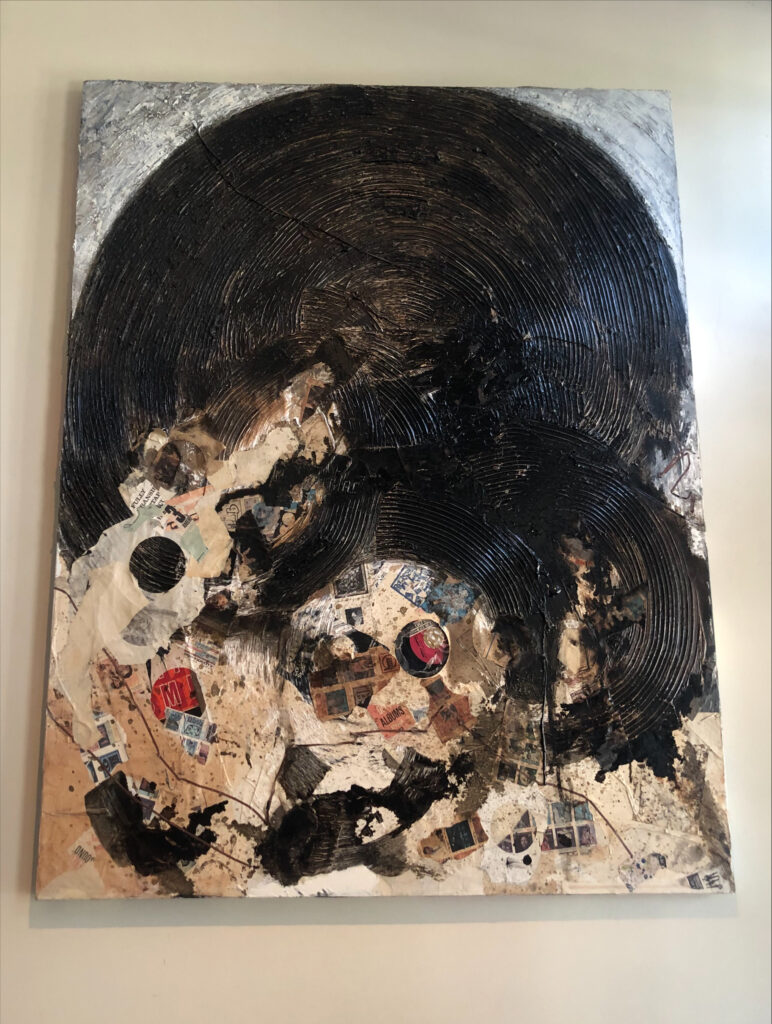Looking out like a sentinel over the interior of Brightwood Park’s HR Records is a complex and imposing mammoth of an art piece. Composed of acrylic, collaged images, found objects, polyurethane, vinyl, and cassette tapes, “33 and a Third of Soul†by local artist Ellington Robinson is as busy as it is meaningful. Naturally, the five-feet-by-four-feet artwork is right at home in a store that sells two of its components: vinyls and cassettes. But what’s perhaps less recognizable is that Robinson’s piece is just as representative of the surrounding community as it is the store.
The piece’s looming, jet-black whorls of vinyl and collage formed from the scraps of cassette tapes and jazz record covers (including covers from iconic jazz giant Blue Note Records) portray the intricate and complicated history of Black musical forms in America, and its

use of recycled and repurposed materials is a powerful act of historical redistribution. By using the old to make something new, Robinson’s piece brings essential but fading histories into the light of day.
The Task at Hand
Fittingly, HR Records busies itself with precisely the same task. One of less than forty Black-owned record stores in the country and situated in a historically Black D.C. neighborhood, the store is rooted in music, community, and the nodes at which the two intersect. Owner Charvis Campbell, a product of Howard University, both buys and sells records through the store and understands both to be acts of redistribution and preservation. “It’s my history, it’s our history,†says Campbell of the store’s massive inventory. In his words, the operation of HR Records is a “duty,†a practice in using music, “one of the most unifying forces,†to build community.
“It’s about sharing what we love with our community,†said Campbell when asked to summarize the store’s mission. “It’s about rare jazz, soul, reggae, and international records and sharing that with the vinyl-loving community.†The store also deals in its fair share of hip-hop and go-go records.
Designed by the District
Campbell is also well aware that the store’s rapidly gentrifying environment, being Brightwood Park and specifically Kennedy Street, further necessitates the accomplishment of its aims. “You could write a dissertation on gentrification just from looking at Kennedy Street,†he quips. He says that while walking along the street one day he counted seventeen ongoing construction projects. With ritzy, unaffordable apartment complexes and products popping up like moles all across the capital, community-focused businesses like HR Records are at once rarities and priceless commodities. “HR,†Campbell assures me, “is a part of the solution.â€
Campbell explains that HR, which stands for “Home Rule,†is “militant at heart.†He and the store are of course driven by love for their community, but also by their tireless efforts to defend that community. A significant part of this task is Campbell and the District’s push for home rule, or the ability of its residents to govern local affairs. Since D.C.’s original organization through the District of Columbia Organic Act of 1801, its constituents have demanded greater voting representation and autonomy. Many of their arguments, in the past as well as the present, echo Pennsylvania representative John Smilie when he contested the passing of the act, warning that “the District will be reduced to the state of subjects and deprived of their political rights.â€
When I asked him about his insistence on home rule, Campbell did what any record store owner worth his salt would do and placed his case in the context of music. He told me about the Washington-born, Howard-educated jazz flutist Lloyd McNeill, who passed away in November of 2021. McNeill, the first ever recipient of Howard’s Master of Fine Arts degree in 1963, released an album seven years later centered on the capital. The McNeill Quartet’s Washington Suite LP contains six tracks. The first of which is titled “Home Rule.†Campbell illustrated through my free history lesson that, like Washington Suite and like “33 and a Third of Soul,†HR Records exists at the intersection of music, history, and action.
Commitment to the Cause
Such is the case of the Home Rule Music and Film Preservation Foundation. Its very name proves its commitment to the same goals the record store strives toward. Campbell and Michael Bernstein cofounded the foundation during the pandemic in 2021, partly as a way to continue the store’s mission while it was restricted to online sales. An early project of the foundation was its Tiny Stage series—a reference to NPR’s Tiny Desk performances—at which local musicians performed live streamed concerts. The foundation also produces documentaries and is currently working on one about the life and work of Cameroonian radio broadcaster Georges Collinet.
Campbell came into contact with Collinet, a D.C. resident, via a chance encounter that encapsulates the uncanny bond between music and the capital. After following up on a tip regarding a man purveying records at a yard sale, Campbell arrived at Collinet’s residence and was astonished by the magnitude of the collection in his basement. He spent so much time among it—six hours, in Campbell’s memory—that Collinet came down to check on him. As the two got to know each other over the course of multiple weeks, Campbell learned that Collinet had run Afropop Worldwide, a Peabody Award-winning radio program, since 1988 and resolved to celebrate his colorful history and encyclopedic knowledge with a documentary.
The preservation mentioned in the foundation’s name lies at the heart of all of Campbell’s work. Both the foundation and the record store are extensions of his duty to educate and rejuvenate a neighborhood and city that seem to fall more out of touch with their forebears each day. As the unforgiving forces of gentrification and commercial expansion snake their way down Kennedy Street, HR Records stands tall as a beacon of hope, as a bulwark against cultural erasure, and as a monument to music, memory, and militancy. To pay them a visit is to pay your respects.
Article image by Jace & Afsoon on Unsplash.


